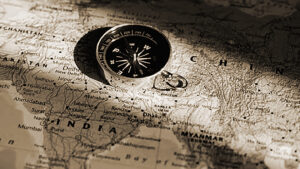Nadim Siraj
COLUMN/ THE HOT POTATO
April 21, 2021: It would be alarming and outrageous to say that the need of the hour is another hard lockdown.
We do need one – a lockdown as hard as it can be. But not for the public. Not for us, humans.
We need a full-scale lockdown on the trade of goods or merchandise between countries. The trade of largely needless products. The trade that is mostly nonessential to us, humans, in these critical times, but important for corporations and traders from rich countries in their pursuit of profits.
It might seem odd to wonder what this proposed lockdown on global trade has to do with controlling the Covid-19 pandemic’s deadly second wave. That’s because it doesn’t figure in mainstream discourses – in newspaper headlines, across social media trends, and on the TV.
No matter how much the fans, fanatics and crusaders of global trade celebrate the idea of export and import of goods to make the world a better place, the inconvenient truth cannot be ignored.
That inconvenient truth is, the guardians of global trade – the infamous cartel of WTO, IMF and World Bank – are arguably responsible for a resurgence of the coronavirus as a second wave now rattles populations around the world.
A simple but least discussed fact is that this virus is not darting across the world only because humans are travelling or assembling outdoors.
As much as through human movement (via public and private transport), the coronavirus is also piggybacking millions and millions of physical goods that are being bought and sold every single day – merchandise or products that are crisscrossing the world, jumping continents in a matter of hours, dashing across time zones by the minute.
Also Read: 30 Years Of Oil Prices In One Simple Chart
Let’s take a step back and try to make sense of what happens to the human race if the global trade of nonessential goods is halted.
In such a scenario, the deadly virus will run out of one of its main carriers – the millions of packages of goods moving around – and the spread of the pandemic could possibly be cut down by half (the other half of the total spread presumably being caused by humans).
In such a scenario, the gruesome act of lockdown on human movement could then be largely avoided – at least in its harshest forms. And many, many jobs, lives and livelihoods would be saved.
Banning the trade of nonessential stuff can seriously be the gamechanger in the fight against the second wave.
Mainstream observers may not serve us on a platter studies proving the link between trade and the spread of Covid-19. But a quick look at the facts on the ground give us a clear picture.
When strict lockdowns (for both the public and goods trade) were dished out in 2020 across continents, the world economy nosedived, but the killer disease was partially brought under control.
Also Read: Social Media Microtargeting and the Ministry of Truth
Around the end of 2020 and the start of this year, lockdowns on human movement and outdoor activity were mostly eased. But notice that the virus still remained somewhat under control.
It started spreading wildly again, but only shortly after global trade (of nonessential goods) was kick-started.
There was desperation in plush corporate boardrooms in almost every country – mostly in the richest ones. What about the tons and tons of goods that are manufactured? They have to be traded, no? No trade means no business. No business means no money. So, global trade had to resume.
By all means. At any cost.
Even if it meant the coronavirus gets a free ticket to travel around the world on carriers. Those carriers are the goods that are traded and moved around internationally.
On March 31 this year, the WTO (World Trade Organization), which stage-manages the trade of largely nonessential goods around the world, emphatically declared that world trade was all set to witness a strong recovery after the pandemic’s initial shock.
“Prospects for a quick recovery in world trade have improved as merchandise trade expanded more rapidly than expected in the second half of last year,” the WTO proclaimed on its website.
“According to new estimates, the volume of world merchandise trade is expected to increase by 8% in 2021 after having fallen 5.3% in 2020, continuing its rebound from the pandemic-induced collapse that bottomed out in the second quarter of last year.”
Also Read: While You’re Reading This, Your Thoughts Are Being Colonised
The global trade police, which the WTO is, further said, “In 2021, demand for traded goods will be driven by North America (11.4%) thanks to large fiscal injections in the United States, which should also stimulate other economies through the trade channel.
Europe and South America will both see import growth of around 8%, while other regions will register smaller increases.
“Much of global import demand will be met by Asia, exports from which are expected to grow by 8.4% in 2021. European exports will increase nearly as much (8.3%), while shipments from North America will see a smaller rise (7.7%).
Strong forecasts for export growth in Africa (8.1%) and the Middle East (12.4%) depend on travel expenditures picking up over the course of the year, which would strengthen demand for oil.”
Two things are amply clear from the numbers given out by the WTO in March end.
Also Read: Two Words Bill Gates And His Pals Despise: ‘Democracy’ And ‘MSP’
One, the second and more deadly wave of the Covid-19 pandemic came only after global trade began to pick up pace earlier this year.
Two, the predictions show a coming jump in the global trade of physical goods, which may result in a further spread of the virus and its newest strains.
Openly ecstatic about global trade’s rebound, the WTO’s Director-General Ngozi Okonjo‑Iweala is quoted in the March 31 WTO update as saying, “Keeping international markets open will be essential for economies to recover from this crisis and a rapid, global and equitable vaccine roll-out is a prerequisite for the strong and sustained recovery we all need.”
No, dear WTO, it’s no way essential to keep international markets open. Rather, it is more essential to save human livelihoods by finding ways to avoid hard lockdowns on human movement.
Nonessential trade is necessary, but only for the proverbial 1% – the class that owns the giant corporate offices in G7 nations – who have a history of minting money by dumping overpriced, under-utility, and largely nonessential goods in poorer nations.
Also Read: Garment Workers Reclaim $22bn From Fashion Giants In Stolen Wages
We are living in times when the human race is trying to coax governments, monarchs and politicians to give us freedom from pandemic-induced human lockdowns.
The last thing we want in these critical times is the free movement of nonessential goods as physical carriers of the virus.
Yet, that’s exactly what’s happening. Trade is back on track. The exchange of mostly nonessential products. The dreaded virus is getting free local, domestic and international trips. And we are banging our heads against the wall, lamenting the need for yet another lockdown on human movement, as if that’s the only reason behind the new surge.
REPUBLISHING TERMS:
All rights to this content are reserved. If you want to republish this content in any form, in part or in full, please contact us at writetoempirediaries@gmail.com.
Watch The Video: Chats From A WhatsApp Group Of World Leaders











